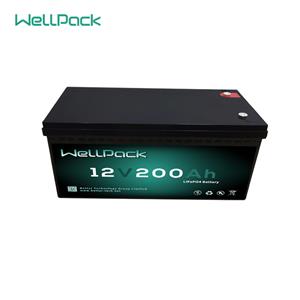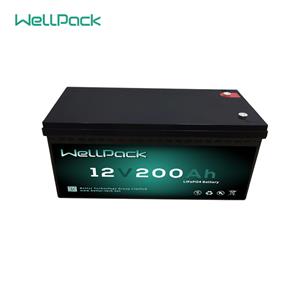
How to Optimize the Use of a 12V 200Ah Lithium Battery in a Home Solar System?
2024-11-08 18:00With the rise of green energy, more and more households are opting to install solar systems for energy self-sufficiency and reduced electricity costs. However, the efficient operation of solar systems relies on reliable energy storage devices. The 12V 200Ah lithium battery has become an ideal choice for home solar energy storage. Nonetheless, users may encounter several issues during actual use. This article will explore the topic of “How to Optimize the Use of a 12V 200Ah Lithium Battery in a Home Solar System? What Common Issues Arise? Why Choose Better Tech's Solutions?” in depth, discussing common problems and their solutions in practical usage scenarios.
Table of Contents
1. How to Effectively Integrate a 12V 200Ah Lithium Battery into a Home Solar System? 1.1 Planning and Design 1.2 Installation Steps 1.3 System Debugging
2. What are the Common Issues with a 12V 200Ah Lithium Battery in Solar Systems? 2.1 Low Charging Efficiency 2.2 Rapid Battery Capacity Degradation 2.3 Safety Hazards 2.4 Compatibility Issues
3. Why Choose Better Tech's 12V 200Ah Lithium Battery to Solve These Issues? 3.1 Efficient Charging Technology 3.2 Excellent Cycle Life 3.3 Multiple Safety Protections 3.4 Outstanding Compatibility
4. Case Study Analysis 4.1 Case One: Improving Charging Efficiency 4.2 Case Two: Extending Battery Life 4.3 Case Three: Ensuring Household Safety
5. Conclusion and Recommendations

1. How to Effectively Integrate a 12V 200Ah Lithium Battery into a Home Solar System?
1.1 Planning and Design To integrate the 12V 200Ah lithium battery into a home solar system, detailed planning and design are essential. Key steps include:
· Energy Demand Assessment: Calculate the household's daily electricity consumption to determine if the battery capacity meets the needs. The 12V 200Ah lithium battery has an energy storage capacity of 2400Wh, suitable for medium-sized households.
· System Configuration: Based on the output power of the solar panels and the battery's storage capacity, configure the number and power of the solar panels reasonably to ensure the battery charges efficiently.
· Component Selection: Choose high-quality inverters, charge controllers, and other auxiliary equipment to ensure the overall performance and stability of the system.
1.2 Installation Steps Effective installation is the foundation for ensuring the lithium battery operates efficiently within the solar system. Major steps include:
1. Determine Installation Location: Choose a well-ventilated, dry, and suitably temperature-controlled area to install the battery, avoiding high-temperature and humid environments.
2. Connect Solar Panels: Connect the solar panels to the lithium battery through the charge controller, ensuring stable, tight connections.
3. Install Inverter: Connect the inverter to the lithium battery to convert DC power into AC power for household use.
4. System Testing: After completing the connections, conduct comprehensive tests on the system to ensure all components are functioning properly and the battery can charge and discharge smoothly.
1.3 System Debugging System debugging is crucial to ensure the efficient operation of the home solar system, including:
· Voltage and Current Testing: Use a multimeter or professional instruments to check the voltage and current at each connection point, ensuring parameters are within normal ranges.
· Charge and Discharge Testing: Simulate charge and discharge scenarios under various loads to ensure the battery can provide stable power.
· Monitoring System Setup: Configure a smart battery management system (BMS) to monitor the battery status in real time, optimizing the charge and discharge processes.

2. What are the Common Issues with a 12V 200Ah Lithium Battery in Solar Systems?
2.1 Low Charging Efficiency
· Issue Description: Some users find that the lithium battery's charging efficiency is low, leading to slower charging and impacting the overall system efficiency.
· Cause Analysis:
o Incompatible Charger: Using an incompatible charger may result in low charging efficiency.
o Poor Environmental Temperature: Extremely high or low environmental temperatures can affect charging efficiency.
o BMS Issues: Improper BMS settings may limit charging speed.
2.2 Rapid Battery Capacity Degradation
· Issue Description: Over time, the capacity of the lithium battery gradually decreases, failing to meet long-term storage demands.
· Cause Analysis:
o Frequent Deep Discharge: Regular deep discharges accelerate battery aging.
o High-Temperature Environment: High temperatures can accelerate internal chemical reactions, leading to capacity decline.
o Improper Charging Management: Irregular charging currents or voltages may impact battery health.
2.3 Safety Hazards
· Issue Description: During use, lithium batteries may face overheating, short circuits, and other safety issues, potentially leading to fires.
· Cause Analysis:
o Lack of Multiple Protections: Absence of overcharge, over-discharge, and overcurrent protection mechanisms can lead to safety problems.
o Improper Installation: Insecure battery installation can cause short circuits or damage.
o Low-Quality Batteries: Using low-quality batteries can create safety hazards.
2.4 Compatibility Issues
· Issue Description: The lithium battery may not be compatible with existing solar systems or other devices, leading to malfunction.
· Cause Analysis:
o Voltage Mismatch: The battery's voltage may not align with the system, preventing effective connection.
o Incompatible Interfaces: Different battery interface types may hinder direct connection.
o Inconsistent Communication Protocols: Mismatched communication protocols between smart systems can cause information transfer failures.
3. Why Choose Better Tech's 12V 200Ah Lithium Battery to Solve These Issues?
3.1 Efficient Charging Technology
· Advantages:
o Smart Charging Control: Better Tech’s 12V 200Ah lithium battery is equipped with an advanced BMS that automatically adjusts charging parameters based on battery status, enhancing charging efficiency.
o Fast Charging Capability: Supports fast charging functions, reducing charging time and increasing overall system efficiency.
o Efficient Energy Conversion: Optimized charging circuit design minimizes energy loss, ensuring more solar energy is converted into usable electricity.
· Solution: Through smart charging control and fast charging technology, Better Tech's lithium battery can charge efficiently in a short time, meeting household solar system electricity needs and avoiding low charging efficiency issues.
3.2 Excellent Cycle Life
· Advantages:
o High-Quality Materials: Uses high-quality lithium iron phosphate (LiFePO₄) materials, offering longer cycle life and higher safety.
o Optimized Battery Management: Precise charge and discharge control reduces battery stress, extending its lifespan.
o Consistent Performance: Maintains stable performance throughout multiple charge and discharge cycles, ensuring reliable long-term use.
· Solution: Better Tech's 12V 200Ah lithium battery significantly extends cycle life through high-quality materials and optimized battery management systems, reducing capacity degradation issues and lowering long-term usage costs.
3.3 Multiple Safety Protections
· Advantages:
o Comprehensive Protection Mechanisms: Built-in protections against overcharging, over-discharging, overcurrent, and short circuits ensure safety under various abnormal conditions.
o High Thermal Stability: Lithium iron phosphate materials possess high thermal stability, reducing the risk of overheating and combustion.
o Robust Shell Design: Uses durable, fire-resistant casing materials to further enhance battery safety.
· Solution: With multiple safety protection measures, Better Tech's lithium batteries effectively prevent overheating, short circuits, and other safety hazards, ensuring user safety and enhancing trust.
3.4 Outstanding Compatibility
· Advantages:
o Standardized Interfaces: Adopts internationally standardized interface designs to ensure compatibility with most solar systems and devices.
o Smart Communication Protocols: Supports various communication protocols for seamless integration with smart battery management systems.
o Flexible System Integration: Adapts to various inverters and charge controllers, meeting the needs of different household solar systems.
· Solution: Better Tech’s 12V 200Ah lithium battery can be easily integrated into existing solar systems due to its excellent compatibility design, resolving compatibility issues and achieving efficient system operation.
4. Case Study Analysis
4.1 Case One: Improving Charging Efficiency
· Background: A family installed a solar system but experienced low charging efficiency with traditional lead-acid batteries, resulting in insufficient nighttime electricity.
· Solution: Replaced with Better Tech’s 12V 200Ah lithium battery, equipped with a smart charging controller.
· Result: Charging time reduced by 30%, providing ample nighttime electricity and significantly improving overall energy utilization efficiency.
4.2 Case Two: Extending Battery Life
· Background: A household frequently replaced lead-acid batteries, incurring high long-term usage costs.
· Solution: Upgraded to Better Tech’s lithium battery, utilizing optimized charge and discharge strategies and high-quality materials.
· Result: Battery life extended to over five times that of traditional lead-acid batteries, significantly lowering long-term usage costs.
4.3 Case Three: Ensuring Household Safety
· Background: A family experienced a small-scale fire caused by overheating when using low-quality lithium batteries.
· Solution: Replaced with Better Tech’s 12V 200Ah lithium battery, featuring a multi-layer safety protection system.
· Result: Stable battery operation with no overheating issues, ensuring comprehensive safety in household electricity usage.
5. Conclusion and Recommendations The 12V 200Ah energy storage lithium battery is a crucial component of home solar systems, offering advantages such as efficient charging, long lifespan, multiple safety protections, and outstanding compatibility. However, users may face common issues such as low charging efficiency, battery capacity degradation, safety hazards, and compatibility problems during actual use. By choosing Better Tech’s 12V 200Ah lithium battery, users can effectively resolve these issues, optimizing the performance and reliability of their home solar systems.
Recommendations:
1. Choose High-Quality Products: Prioritize reputable lithium battery brands like Better Tech to ensure performance and safety.
2. Plan the System Rationally: Consider energy demands and battery capacity comprehensively when designing home solar systems to ensure balance and efficiency.
3. Regular Maintenance and Monitoring: Use a smart battery management system to monitor battery status in real time and conduct regular maintenance to extend battery life.
4. Safety First: Strictly follow installation and usage guidelines to ensure the safe operation of battery systems and avoid potential safety hazards.
With scientific and rational choices and usage, the 12V 200Ah energy storage lithium battery will provide reliable and efficient energy support for home solar systems, contributing to a green and sustainable lifestyle.
